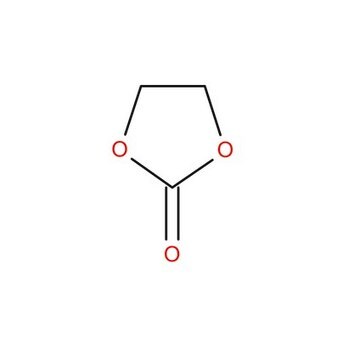517135
Diethyl carbonate
anhydrous, ≥99%
Sinonimo/i:
Diatol, Eufin, H-DEC
About This Item
Prodotti consigliati
Grado
anhydrous
Densità del vapore
4.1 (vs air)
Tensione di vapore
10 mmHg ( 23.8 °C)
59 mmHg ( 37.8 °C)
Saggio
≥99%
Caratteristiche più verdi
Less Hazardous Chemical Syntheses
Safer Solvents and Auxiliaries
Design for Degradation
Learn more about the Principles of Green Chemistry.
sustainability
Greener Alternative Product
Impurezze
<0.002% water
<0.005% water (100 mL)
Indice di rifrazione
n20/D 1.384 (lit.)
P. eboll.
126-128 °C (lit.)
Punto di fusione
−43 °C (lit.)
Solubilità
water: insoluble
Densità
0.975 g/mL at 25 °C (lit.)
Categoria alternativa più verde
Stringa SMILE
O=C(OCC)OCC
InChI
1S/C5H10O3/c1-3-7-5(6)8-4-2/h3-4H2,1-2H3
OIFBSDVPJOWBCH-UHFFFAOYSA-N
Cerchi prodotti simili? Visita Guida al confronto tra prodotti
Descrizione generale
Applicazioni
- Synthesis of β-enamino esters.
- Synthesis of carbamates and unsymmetrical alkyl carbonates, via reaction with aliphatic amines or alcohols by using a hybrid organic-inorganic material prepared by anchoring TBD to MCM-41 silica.
- As solvent in ruthenium catalyzed direct functionalisation of arene C-H bonds by aryl halides.
- To compose the commercial liquid electrolyte for lithium ion batteries.
- Homogeneous alkoxycarbonylation of cellulose.
Caratteristiche e vantaggi
Avvertenze
Warning
Indicazioni di pericolo
Consigli di prudenza
Classi di pericolo
Flam. Liq. 3
Codice della classe di stoccaggio
3 - Flammable liquids
Classe di pericolosità dell'acqua (WGK)
WGK 1
Punto d’infiammabilità (°F)
77.0 °F - closed cup
Punto d’infiammabilità (°C)
25 °C - closed cup
Dispositivi di protezione individuale
Eyeshields, Faceshields, Gloves, type ABEK (EN14387) respirator filter
Certificati d'analisi (COA)
Cerca il Certificati d'analisi (COA) digitando il numero di lotto/batch corrispondente. I numeri di lotto o di batch sono stampati sull'etichetta dei prodotti dopo la parola ‘Lotto’ o ‘Batch’.
Possiedi già questo prodotto?
I documenti relativi ai prodotti acquistati recentemente sono disponibili nell’Archivio dei documenti.
I clienti hanno visto anche
Articoli
Experts discuss challenges and production processes of nickel-rich layered oxide cathode materials in energy storage systems.
Solid-state lithium fast-ion conductors are crucial for safer, high-energy-density all-solid-state batteries, addressing conventional battery limitations.
Solid oxide fuel cells and electrolyzers show potential for chemical-to-electrical energy conversion, despite early development stages.
Lithium-ion batteries offer high energy density and cyclic performance for portable electronic devices.
Contenuto correlato
Green chemicals evaluation aligns with the 12 Principles of Green Chemistry, emphasizing resource efficiency and hazard reduction.
Il team dei nostri ricercatori vanta grande esperienza in tutte le aree della ricerca quali Life Science, scienza dei materiali, sintesi chimica, cromatografia, discipline analitiche, ecc..
Contatta l'Assistenza Tecnica.










